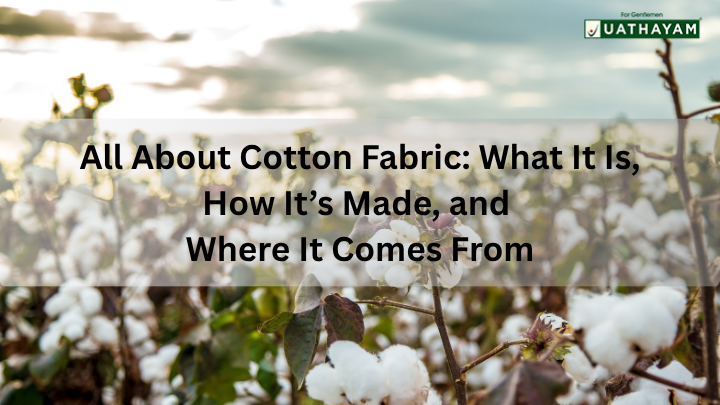What Are The Advantages and Disadvantages of Cotton Fibre Shirts?
Cotton, a natural fibre known for its versatility and widespread use, is significant in the textile industry. Renowned for its comfort and durability, cotton fabric is a staple in wardrobes and households worldwide.
This article delves into cotton's various advantages and drawbacks, offering a balanced perspective on why it remains a favoured choice despite the emergence of synthetic alternatives.
Cotton's benefits are manifold for clothing, home décor, or industrial applications. Yet, its environmental and economic impacts must be considered.
Let's get into some cotton fibre shirt advantages and disadvantages, providing valuable insights for consumers and industry professionals alike.
What are Some Advantages of Cotton Fibre Shirts?
Natural and Comfortable:
Cotton's natural origin is a core attribute that contributes to its comfort. Unlike synthetic fibres, cotton is derived from the cotton plant's fluffy bolls, providing a soft and gentle touch against the skin. This natural composition allows the fabric to breathe, making it an ideal choice for clothing, especially in warmer climates.
The comfort factor extends beyond the feel. Cotton's hypoallergenic properties reduce the risk of skin irritations, making it suitable for sensitive skin and allergen-free textile needs.
Durability and Strength:
Cotton fibre Shirts are known for their durability and strength, translating into long-lasting fabric. This resilience makes cotton a practical choice for daily wear and items that undergo frequent washing.
The strength of cotton fibres ensures that they withstand the rigours of regular use without compromising the fabric's integrity, offering consumers a good return on their investment in cotton products.
Breathability:
One of the standout features of cotton shirts is its breathability, which is paramount for wearer comfort. The fabric's ability to allow air circulation helps regulate temperature, keeping the body cool in hot conditions and warm in more relaxed environments.
This makes cotton shirts an excellent choice for various clothing, from summer dresses to winter layers.
Hypoallergenic Properties:
Cotton's hypoallergenic nature is a boon for those with sensitive skin or allergies. The fabric's natural composition minimizes the risk of allergic reactions, making cotton garments and textiles a safe choice for baby clothing, bedding, and other products that come in direct contact with the skin.
Moisture Control:
Cotton's ability to absorb and release moisture quickly makes it a preferred fabric for activewear and in climates with high humidity.
This moisture-wicking quality helps keep the body dry and comfortable, reducing the likelihood of moisture-related skin irritations.
Insulation:
Despite its breathability, cotton shirts also provide insulation during cooler months. The fabric's ability to trap air between its fibres helps retain heat, offering warmth in colder conditions without causing overheating.
Ease of Care:
Another advantage of cotton fabrics is their ease of care. Cotton shirts can typically be machine-washed and dried, and many cotton fabrics can withstand high temperatures, making them easy to iron and maintain.
Versatility:
Cotton's adaptability is evident in its wide range of applications, from casual wear to formal attire and home furnishings to medical supplies.
This versatility underscores cotton's universal appeal and ability to meet various functional and aesthetic requirements.
Environmental Impact:
Cotton is biodegradable and, when grown organically, can be a sustainable choice. Unlike synthetic fibres, Its natural decomposition process doesn't contribute to landfill issues.
However, farming practices significantly influence the environmental benefits, emphasizing the need for sustainable cultivation methods.
Easy to Dye and Print On:
Cotton's natural composition makes it an excellent medium for dying and printing, allowing for a vast range of colours and designs. This versatility means that cotton shirts can come in a wide array of styles, catering to different tastes and fashion trends. Whether you prefer solid colours, intricate patterns, or vibrant prints, cotton can accommodate it all with ease.
Affordability:
Cotton offers excellent value. It's generally more affordable than many synthetic or luxury natural fabrics, making it accessible to a wide range of consumers. The durability of cotton also means that it offers a good return on investment, lasting longer than many cheaper synthetic alternatives.
Sustainability Options:
For those concerned about the environmental impact of their clothing choices, cotton offers options like organic cotton, which is grown without harmful pesticides or synthetic fertilizers. This sustainable approach reduces the environmental footprint and supports healthier ecosystems.
What are Some Disadvantages of Cotton Fibre Shirts?
While cotton shirts are celebrated for their numerous benefits, they also have several significant drawbacks, especially from an environmental, economic, and practical standpoint. Here are some cons of cotton fibre shirts:
Water Consumption:
Cotton cultivation is notoriously water-intensive. It requires enormous amounts of water to grow, with estimates suggesting that about 10,000 litres are needed to produce just one kilogram of cotton. This immense water usage strains water resources, particularly in arid regions where water scarcity is a pressing issue.
Susceptibility to Damage from High Heat:
Cotton fibres can be damaged by high heat, affecting the fabric's overall durability and appearance. Care must be taken when ironing or drying cotton to avoid exposure to temperatures that could weaken or burn the fibres.
Economic Vulnerability:
Cotton farmers often face economic vulnerability due to fluctuations in global cotton prices. They can be subject to significant financial instability, exacerbated by unpredictable weather conditions, pest infestations, and changing market demands.
Reliance on a single crop also makes farmers more susceptible to economic downturns if the cotton market suffers.
Shrinking and Creasing:
From a consumer perspective, cotton shirts are prone to shrinking and creasing. This means they require more care in washing and ironing than garments made from synthetic fibres. The tendency to shrink can also affect the longevity and fit of cotton clothing, potentially leading to a shorter lifespan and more frequent replacements.
Wrinkles Easily:
One of cotton's significant drawbacks is its propensity to wrinkle. Cotton shirts often emerge from the laundry with creases and folds, necessitating regular ironing or steaming to maintain a neat appearance. This can be time-consuming and may deter some individuals from choosing cotton for everyday wear or when travelling.
Can Retain Moisture:
While cotton's absorbency is often seen as an advantage, it can also be a drawback. Cotton can hold onto moisture, which can be uncomfortable in wet conditions or when the wearer is sweating heavily. This retained moisture can also make cotton shirts feel heavy and lead to longer drying times.
Colour Fading:
Cotton fabric shirts tend to lose their colour vibrancy over time, especially with frequent washing and exposure to sunlight. This fading can diminish the aesthetic appeal of cotton garments and textiles, leading consumers to replace them more often than they might with more colour-stable materials.
Mildew and Insect Damage:
Cotton shirts are susceptible to damage from mildew and various insects. If not properly stored or maintained, cotton products can develop mildew, particularly in humid conditions. Insects such as cotton bollworms can also cause significant damage to cotton crops, impacting yield and quality.
Durability Issues:
While cotton is known for its comfort and breathability, it is generally less durable than some synthetic fibres. Over time, cotton fibres can break down, leading to wear and tear on cotton products. This reduced durability means that cotton items and products from more robust materials may not withstand heavy use or frequent washing.
Pollution and Waste:
The cotton industry contributes to pollution and waste at various stages of the production process. From the chemical runoff in farming to the industrial waste generated during the processing and manufacturing of cotton products, cotton's environmental footprint is significant.
Additionally, post-consumer waste is a concern, as discarded cotton shirts contribute to landfill mass and the overall problem of textile waste.
Not Ideal for Athletic Wear:
Due to its moisture-absorbing properties, cotton is often not the best choice for athletic wear. It can become heavy and uncomfortable when saturated with sweat, which can hinder performance and lead to discomfort during physical activities.
Conclusion
At Uathayam Store, quality reigns supreme. Our cotton shirts and kurtas are crafted with precision and care, using only the finest quality materials. Each garment undergoes rigorous quality checks to ensure durability and long-lasting wear.
Say goodbye to discomfort and hello to ultimate comfort with Uathayam Store. Our cotton shirts and kurtas are designed with your comfort in mind.
Enjoy the freedom of movement and unparalleled comfort, whether at work, socializing with friends, or simply relaxing at home. Experience the difference that premium-quality cotton makes in your daily wear.
Upgrade your wardrobe with the best cotton shirts and kurtas from Uathayam Store. Experience the perfect blend of style, comfort, and quality with our meticulously crafted garments.
Shop now and redefine your fashion quotient effortlessly with our Cotton shirts!






